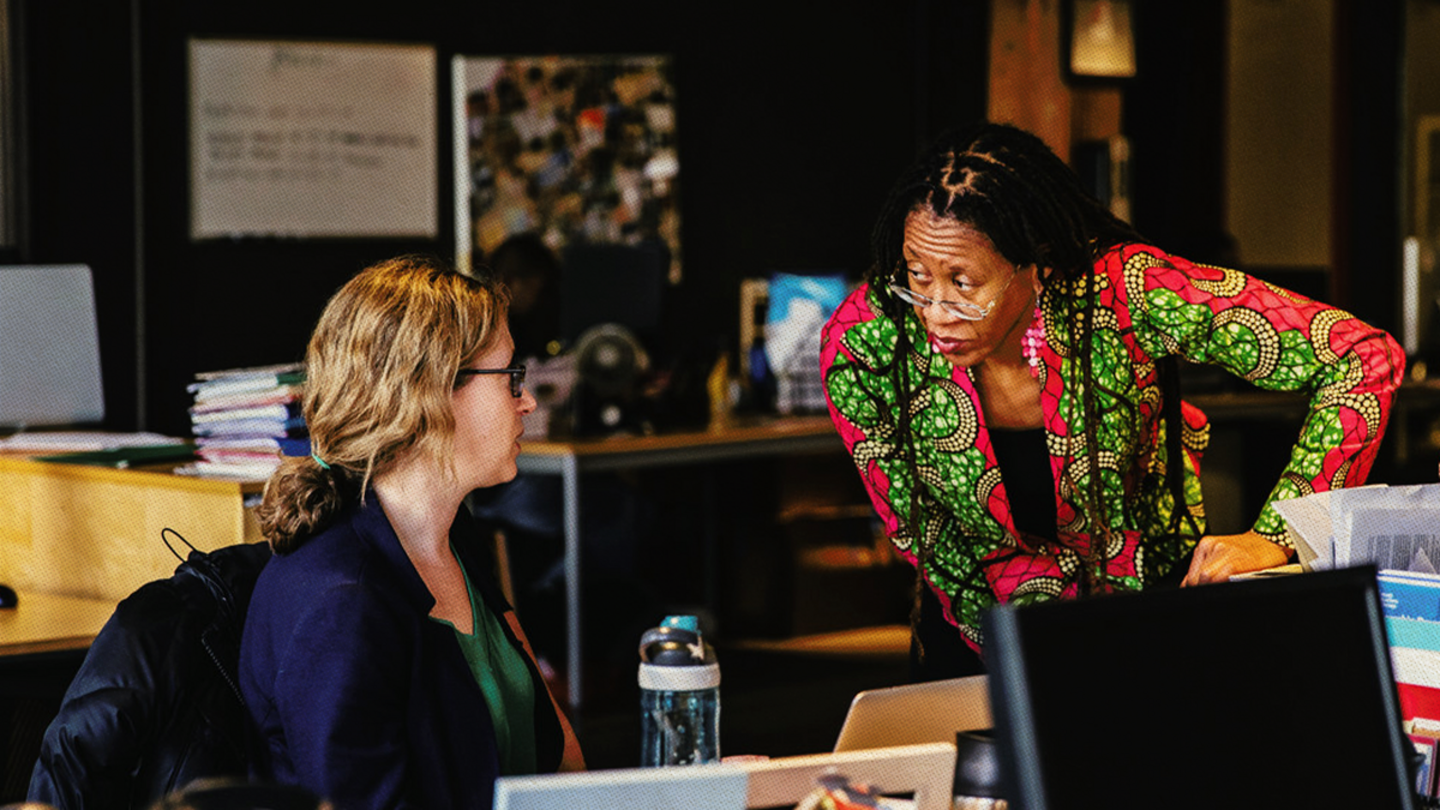With all the hype surrounding AI in recent years, it’d be easy to assume it to be the most coveted skill among employers. It’s not.
The skill workers need most to succeed has nothing to do with AI and everything to do with becoming more human.
In fact, according to LinkedIn research, the No. 1 desired trait in a new employee is communication. Most skills on LinkedIn’s list are known as “soft skills.” They include things like customer service, leadership, and problem-solving.
“Soft skills are essential to ensuring that you will be successful on the job,” said Jill Rizika, CEO of Towards Employment, a workforce development organization in Cleveland, Ohio. But how can leaders help their employees work to better develop these skills for themselves?
As part of its career readiness program, Towards Employment offers a two-week workshop specifically devoted to soft skills development. For participants, the deliberate way this organization teaches these “human” skills is often a first. It’s like they’re finally learning to speak a language everyone around them already knows. Having the words to identify, define, and develop these skills can be life-changing.
The biggest revelation for participants: They are not inherently flawed. They are not defective. Nor are they powerless to change the patterns that keep them perpetually in and out of work. These previously hidden skills — the ones you need to get a job and keep it — can be learned.
Relational poverty can lead to chronic unemployment
Chronic unemployment is a societal issue, but it is also a symptom of other, more subtle issues in an individual’s life. “A large part of not having access to opportunity means you may not have grown up in a family or in a neighborhood where things are modeled,” said Rizika. “Behaviors that are expected in the workplace or an office environment, for example, may not have been modeled for you, so you have some bridging to do.”
A child growing up in a high-stress environment — generational poverty, abuse, foster care, substance use, mental illness, criminal justice involvement — misses opportunities to develop interpersonal “soft” skills that our society assumes all adults should know. Poverty is often associated with a lack of money, but that simplifies the issue too much.
Relational poverty, the absence of healthy relationships in a person’s life, can and does easily turn into financial poverty. When healthy relationships are scarce from childhood onward, soft skills can be lacking, creating a cycle in which poor behavior leads to isolation and chronic job loss. The cycle continues as the person, without guidance or models to learn from, remains unaware of what to change.
These skills can be more important than job-specific “hard skills” like technical training said Karla Hopkins, a workshop facilitator at Towards Employment. “You may have someone that can do the job, and they can do a very good job of it, but they may not be able to work on a team, or they may not have professional communication or be dependable.”
According to Hopkins, some employers have started prioritizing soft skills over hard skills. “Sometimes they’ll look at those transferable skills and say, ‘You know what, this person is someone that I’m willing to train because they have these soft skills.’”
Society expects adults to know these things, but that’s not always the case
The idea of teaching soft skills may seem intimidating because they aren’t as tangible as data science or medical training, but Towards Employment’s facilitators have learned that participants are hungry for this information. As they model healthy behavior themselves, facilitators mix deliberate instruction, concrete examples, and lots of discussion.
To teach motivation and initiative, Hopkins shares a story about Jane and Robert. Both finish their work early, but Jane scrolls through TikTok, while Robert offers to help a colleague. “Who will get the promotion?” Hopkins asks.
For professional communication, she explains that slang isn’t appropriate at work and emphasizes the importance of active listening, noting that not listening during training on dangerous machinery could cost a thumb.
In conflict resolution, she advises using “I” statements instead of “you” statements for clearer, less confrontational communication.
The problem Hopkins is addressing in these lessons is that generally our society expects adults to know these things, and that’s not always the case. “I would say some know, but some don’t,” said Hopkins. As the group talks about soft skills, participants will instinctively start applying them to their own work experience. “It clicks, and they talk about their experiences in other jobs and how they may have handled it, and if they would have handled it another way, how they could have benefited from it.”
‘The way I present myself can be challenging to people’
One young man came to Towards Employment not because he needed help getting a job – but because he had difficulty keeping a job.
“He came across as this big, assertive guy,” said Ron Scott, a training services program manager. The young man could get jobs regularly, but his assertive communication style was a barrier to keeping them.
Scott and this individual spent hours talking about the soft skills he was learning in the workshop. This level of dedication, long hours of listening, and relationship-building are key to reaching people. Scott said it helps build rapport with participants. “We see each person as an individual. We hear their stories, and we tailor our support to fit their needs.”
One day, the young man finally had an “aha” moment: It was up to him to take responsibility for his communication style.
“OK, the way I present myself can be challenging to other people,” he told Scott. “I need to think about how I present myself to people.” His self-awareness, emotional intelligence, and communication styles all changed, and he learned he could retain his own “voice” while becoming more effective in the world of work.
Now he works in a stable job at a plating company, runs his own drywall business, and mentors other young men in a gang intervention program.
Sign up for Stand Together's Rethinking Work & Learning newsletter to get the latest stories, ideas, and trends on the future of employment.
Requiring soft skills of workers doesn’t get employers off the hook
Rizika cautioned that employers often use “soft skills” to label a wide range of behaviors, putting the burden on employees to conform without considering underlying life circumstances.
For example, punctuality issues might be viewed as personal failings rather than issues with public transportation schedules. If a bus drops employees off 45 minutes early or a few minutes late, workers may be chronically tardy despite their best efforts. Employers should consider these unseen issues rather than solely blaming employees for lateness.
“Punctuality is a behavior, not a soft skill,” said Rizika. “It is influenced by many external factors, like bus schedules and childcare availability, and should be addressed by understanding and mitigating these systemic issues rather than blaming the worker.”
She knows of a company that changed its entire shift schedule to align with the bus schedule, making it easier for employees to be on time to work.
Sometimes employer inflexibility has a lasting impact on workers. After repeated bad experiences with employers, a worker will start to feel perpetually defeated and say things like, “Why should I try with any of this stuff? I know it’s not going to turn out. I know I’m gonna lose this job after three months.”
“It’s not just about a worker not having confidence,” said Scott. “It’s also that the world of work hasn’t encouraged many frontline workers to think of themselves as anything beyond a cog in a wheel.”
Soft skills are crucial for individual success, but their impact is magnified when workplaces are structured to support and nurture these competencies. This might include redesigning jobs to be more fulfilling, providing continuous learning opportunities, or creating clear career advancement pathways. Employers can foster a supportive and inclusive workplace culture that addresses the social and emotional needs of workers.
“It’s not just about fixing the worker but fixing the work,” said Rizika.
Goal setting combined with problem-solving can alter a person’s trajectory
Soft skills also affect how people see themselves. It can be hard for them to picture themselves doing a job they’re not familiar with. Oftentimes, they don’t know what they don’t know, which is why it’s important for them to explore their options and set goals — a soft skill many have never learned.
One young woman came into Towards Employment convinced she wanted to be a state-tested nurse’s aide (STNA). But after exploring other options, she set a goal to become a pharmacy technician. When Scott asked her about the decision, she said, “My mom is an STNA, my aunt is an STNA. I didn’t know there was anything else out there.”
“We have these conversations all the time,” Scott said. “People believe they can only go where they’ve been, and do what they know. So part of it is simply that confidence to envision yourself in a position that you’ve not had any experience with before.”
This issue affects workers at all levels. Companies can help by being transparent about advancement opportunities, clearly communicating the pathways for growth, and providing necessary support and resources. Doing so not only motivates employees to look beyond what they’re familiar with, but also fosters a culture of trust and engagement. The result is better retention and overall job satisfaction.
As participants practice setting goals, facilitators teach them to problem-solve. “When they set their goals, we say, ‘What barriers do you have that are keeping you from fulfilling this goal?’” said Hopkins.
After listing their barriers, the next question is, “So what action steps can be taken to get around those barriers?”
Employers can be more deliberate about recognizing employees’ personal barriers as well. Treating barriers openly as problems to solve, not secrets to hide, empowers employees to do the same. If childcare is a struggle, employers can be encouraging about finding a workable solution or even support the employee with their search.
In Northeast Ohio, Towards Employment manages an employer collaborative called the Employer Resource Network. Member businesses pool resources to provide on-the-job coaches to work with entry-level employees. Together the coach and employee address barriers to retention and advancement that are specific to each individual and workplace.
Watching people reach new heights is Hopkin’s favorite thing about her job. “Seeing them achieve their goals and have a sustainable living, that’s the love for me,” she said.
“For me, it’s been the in-depth, meaningful conversations with our participants about their lives and experiences,” said Scott. Since 40% of the organization’s staff are graduates or share similar lived experiences as current participants, the appreciation for what it takes to succeed is deeply personal.
“To be part of a process of celebrating and honoring the resilience our graduates have shown in order to get to this place and keep going despite all these barriers — it’s awe-inspiring and humbling.”
***
Towards Employment is supported by Stand Together Foundation, which partners with the nation’s most transformative nonprofits to break the cycle of poverty.
Learn more about Stand Together’s efforts to transform the future of work and explore ways you can partner with us.

Here’s how to bridge the disconnect between employers and employees.

Lessons learned from Colorado.

Could a program built to develop music talent change the way we think about education?

How to help the talent of today fill the jobs of tomorrow.
